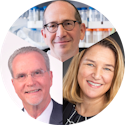By clicking to watch this video, you agree to our privacy policy.
On 11 October 2017, David Ledbetter discussed the progress made by Geisinger Health System’s Precision Health Center – in partnership with Regeneron Genetics Center – towards advancing research and innovation by leveraging electronic health data and exome sequence data. Such an approach has already led to the successful identification of new drug targets and improved prevalence estimates of common Mendelian conditions, including familial hypercholesterolemia, BRCA-related cancers and Lynch syndrome, as well as autism spectrum and neuropsychiatric copy number variant disorders.
His talk is part of the Simons Foundation Autism Research lecture series.
About the Lecture
Healthcare providers, government agencies and research groups are using data drawn from decades of electronic medical records to improve patient care and to identify the genetic mutations responsible for conditions such as autism spectrum disorders. Called the Learning Health System model, the approach is helping transform the health care system into one that can more rapidly learn, adapt and improve.
In this lecture, David Ledbetter described Geisinger Health System’s Precision Health Center. The center makes available more than 20 years’ worth of electronic health data for research and innovation. In partnership with Regeneron Genetics Center, Geisinger now has exome sequence data for more than 92,000 patient-participants, with an ultimate goal of 250,000.
Those data have already led to the successful identification of new drug targets, improved prevalence estimates of the most common Mendelian disorders (including familial hypercholesterolemia, BRCA-related cancers and Lynch syndrome) and the identification of autism spectrum and neuropsychiatric copy number variant disorders in 0.8 percent of the dataset’s adult participants. These results are already having a positive impact on individual participants, their family members and their primary care physicians.




